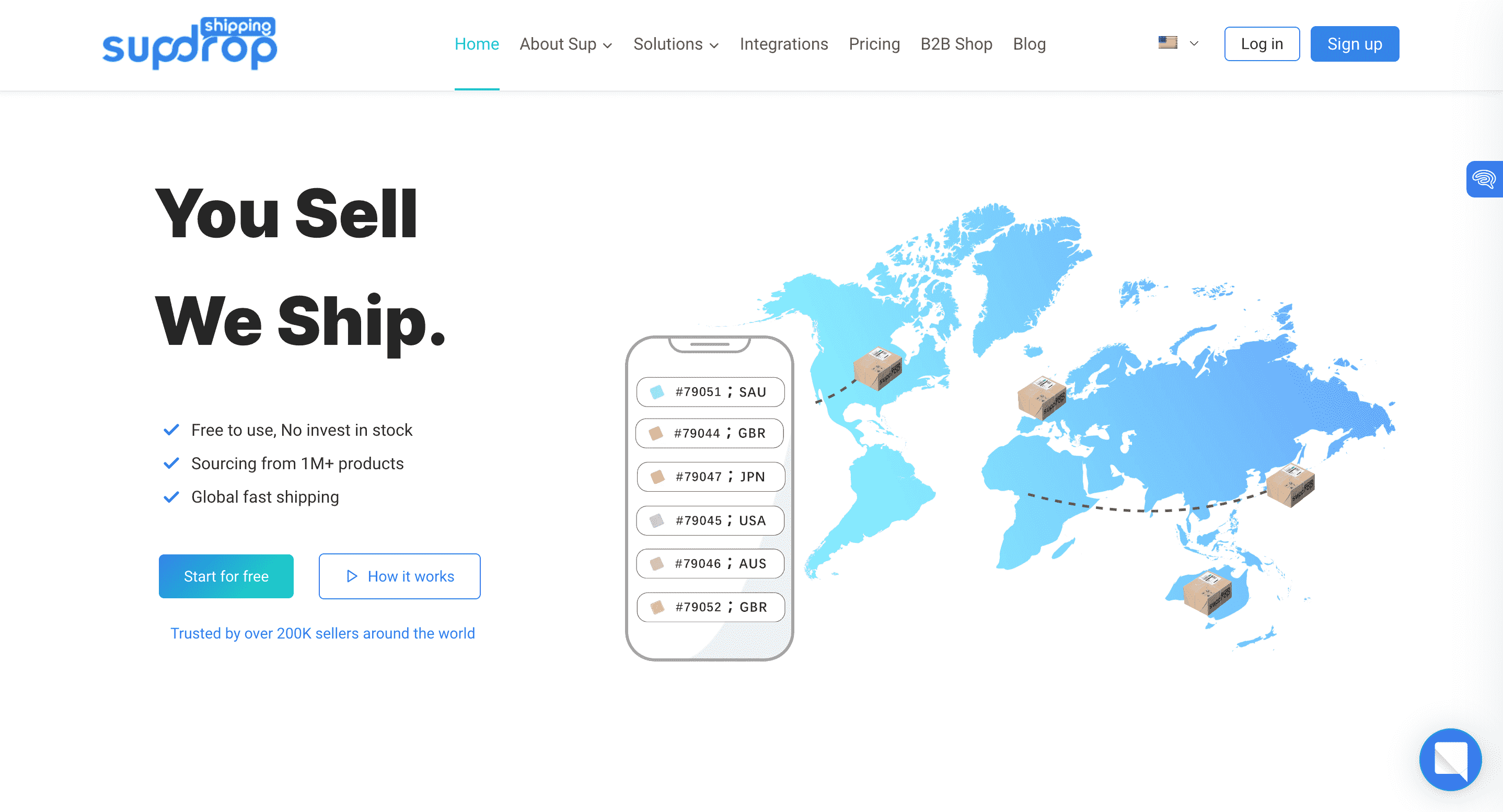12 eCommerce Business Ideas to Jumpstart Your Online Business Creation in 2025
Launching an online business is definitely easier compared to starting traditional brick-and-mortar stores. Among all other benefits, the stakes are lower, and the overhead costs are significantly cheaper.
But let’s face it—without a viable and profitable eCommerce business idea, becoming an online entrepreneur still feels like taking a shot in the dark.
To help brighten your path towards eCommerce success, our veterans here at Sup Dropshipping decided to bring our expertise together and compile the top 12 eCommerce business ideas that will surely thrive in today’s digital age.
Keep reading to turn your dream of having an online business into reality!
12 highly profitable eCommerce business ideas in 2025

Without further ado, let’s go through the 12 most profitable business ideas to start online.
1. Start Dropshipping
Time and time again, dropshipping proves itself to be the most cost-effective and beginner-friendly eCommerce business idea.
And no, we’re not just saying this because we work directly in the industry.
Just one glance at the dropshipping business model and its current market value of more than $300 billion, and you’ll immediately realize how profitable this business idea can be.
See, a dropshipping store owner never has to worry about buying products in bulk, managing inventory, or fulfilling the hassles of shipping orders.
As a dropshipper, you simply need to create a virtual storefront that allows customers to purchase the products offered by your chosen suppliers. Then, the suppliers will handle the rest of the work needed to complete that purchase.
Of course, there’s still some work involved in dropshipping.
But, all the responsibilities you can expect from creating a dropshipping store are not so different from those you’ll need to do when you start any other online business.
If you want to get your own dropshipping store up and running without tons of hassles and bustles, we highly recommend contacting dropshipping agents such as Sup Dropshipping.
For a small fee, we’ll not only find you the most profitable products to dropship but also help you with the exact step-by-step process of dropshipping, from store creation all the way to marketing your business!

2. Launch a Print-on-Demand store
Print on Demand (POD) is another money-saving eCommerce business idea that’s very similar to dropshipping.
In this business model, the product-making process only starts when customers place an order, and the suppliers themselves will ship the items to customers.
So, as the POD store owner, you won’t have to invest in or hold inventory.
Sounds very similar to dropshipping, right?
But, well, there’s one major difference between dropshipping and Print-on-Demand, and that’s customization.
The Print-on-Demand products offered by suppliers are typically “blank” items that you can design or customize before selling.
To name some examples, think of blank white mugs, plain shirts, and hoodies without any graphics, text, or unique design.
As you can imagine, these items are gonna be pretty boring on their own. So, as a POD seller, you must be deeply involved in designing every item you sell so suppliers can “print” your original designs when customers order.
Don’t worry. You don’t need to be a Picasso-level artist to design POD products.
Many POD suppliers have very convenient editing software that makes it incredibly easy to customize your products. If you want a closer look at one example, here’s Sup Dropshipping’s very own POD editor!
3. Try the classic wholesaling route

Observe the small brick-and-mortar businesses in your local area, and you’ll realize that most of them participate in some type of wholesaling. In simpler terms, they buy items in bulk to gain discounts from wholesalers and then resell items for a profit.
If you want to build an online store, you can also implement this very same classic approach of buying your inventory in bulk.
Once you have your products on hand, just proceed to list them online, and when customers place an order, personally complete the order fulfillment process yourself.
It’s worth noting that wholesaling is gonna take more effort and a relatively high upfront investment from your end.
However, the benefits of this business idea include having direct control over the product quality, enjoying higher profit margins, and accommodating customer concerns or questions ASAP, as you won’t be relying on third-party suppliers.
4. Sell handmade goods
If you’re skilled in making handmade goods and are willing to spend hours doing the craft, then you can absolutely turn your hobby into a moneymaking machine by selling the handmade products you make online.
The beauty of this business idea is that you’ll be able to create something that feels close to you, making the journey of your eCommerce entrepreneurship more enjoyable.
But of course– profits-wise, you’re also looking at a high potential for good earnings!
Etsy, which is the number 1 platform for selling handmade or personalized products online, is home to over 95 million active buyers from all over the globe.
This shows that even in a world where factory-made items are extremely cheap, there are still avid enthusiasts of handmade crafts worldwide!
Now, of course, you likely won’t be getting hundreds of orders per day when you start out selling handmade goods. But if you focus on creating high-quality products, regularly reach out to your target market, and consistently improve your craft, you can carve out a successful eCommerce business for yourself.
5. Create a niche apparel brand

With a market value of over $800 billion, fashion in eCommerce is certainly one of the most profitable industries you can enter when creating an online store.
Almost everyone orders some form of clothing online, so if you can offer a trendy, high-quality, and sustainable apparel brand, you can rapidly grow your customer base and revenue through this business idea.
How exactly can you start a clothing line from the comfort of your home?
Well, by now, you know most of the secrets!
You can either dropship apparel items, leverage print-on-demand to design clothes yourself, or buy bulk and resell clothing items online.
All of these have the potential to become successful, but regardless of how you approach your apparel business, keep this tip in mind:
You gotta niche down! That’s the most reliable way to succeed.
Don’t try to sell pajamas, sportswear, and undergarments in the same store.
You want to target a very niche segment of the apparel industry. That way, when people need the products you offer, you’ll be the first store that comes to mind.
6. Offer eco-friendly product alternatives
Most people are tired and pretty scared of further ruining the environment by using unsustainable or one-time-use materials such as plastic or single-use packaging.
In fact, a recent survey showed that 71% of consumers had bought a product based on how sustainable it was rather than its price.
Existing businesses will likely interpret this data by simply becoming more eco-friendly than before.
But as someone who has the opportunity to start from scratch, you can seize this moment to start selling eco-friendly product alternatives exclusively!
Some examples of profitable products you can sell in this business idea include:
- Reusable bags
- Biodegradable packaging materials
- Naturally-made toys
- Steel straws
- Eco-friendly cleaning products
And the best part about selling eco-focused products is that people are willing to pay more to make a difference.
7. Sell your best services
We may have only covered business ideas that sell products so far, but did you know selling services online can be just as profitable?
I made a quick visit to Fiverr, a popular online marketplace for freelance services, and saw that gigs such as website designing can now easily fetch up to $1000 per completed task.
That said, if you have skills that you’re confident about, try offering them to individuals or businesses in need.
Some examples of high-demand skills in the current market include:
- Website designing
- Translation
- Copywriting
- Video editing
- Graphic designing
But if you know how to market to the right audience, virtually every skill out there can be profitable!
Once you’re ready to lend your skills to others, you may offer them as services on platforms like Upwork and Fiverr, pitch them directly to businesses, or create your own online store that you can then market online.
8. Sell online courses
Another way to monetize your skills is to create and sell online courses to teach ideas you’re knowledgeable about.
You don’t need to be an experienced teacher or a licensed professional to sell online courses. So, even if you’re just passionate about a topic, you might still want to give selling courses a shot!
There are plenty of ways to create online courses, including crafting an eBook, recording video or audio tutorials, and organizing detailed lessons.
It’s really up to your preference and creativity to decide how or where you want to sell your online courses in the digital realm.
9. Create digital products
As the name suggests, digital products are products that exist in a digital form.
Some of the most common examples of these goods include online courses, memberships, and eBooks.
But if you want a clear example of highly successful digital products, just look at streaming services like Netflix and Disney+.
Why sell digital products instead of the classic physical ones?
To name some advantages, they’re cheaper to make and easier to deliver to customers. But the real kicker is that a single digital product can potentially be sold unlimited times, allowing you to secure incredibly high-profit margins per digital product made.
Note: Some of the most popular platforms you can use to sell digital products include Etsy, Gumroad, and, of course, your own eCommerce website through platforms like Shopify.
10. Monetize 3D printing
The invention and popularity of 3D printers made it possible for regular individuals to create factory-quality customized objects. If you’re someone who has a knack for operating this innovative machine, you have the opportunity to sell the items you 3D print online!
In a nutshell, here’s what you need to do to be a 3D printing merchant:
- Figure out the type of 3D-printed items you’re skilled at making.
- Prepare at least several designs to present to potential customers.
- Create an online store or list products on marketplaces.
- Share your business with the world!
Got a 3D printer but are not too adept at making original 3D designs yourself?
No worries! Many 3D designers sell STL files with commercial licenses. So, just find some that have the potential to be a hot-selling product when printed!
11. Make subscription boxes
A subscription box is a curated package containing physical products under the same theme and is shipped to subscribed customers on a recurring schedule.
To give some examples of this concept, HelloFresh sends out weekly food subscription boxes catering to the specific dietary needs of its customers. Similarly, the company BarkBox delivers surprise doggy treats and toys to dog owners every month.
Like these now-successful companies, you can also make and sell subscription boxes for a specific niche of your liking.
Just know exactly what your target audience needs or wants on a recurring basis, and offer a regular subscription box fulfilling those desires!
Yes— there’ll be inventory involved from your end in this business idea. But since customers will be paying upfront, you can manage cash flow effectively, allowing you to continue operations even with a slightly tight budget.
12. Flip secondhand products
Do you have a knack for breathing new life and value into secondhand items?
Then, flipping might be the eCommerce venture for you.
As a flipper, you must always be on the hunt for cheap secondhand products. Once you’ve acquired them, give the products a little makeover and resell each for a profit online.
Some of the best items you can flip include:
- Children’s toys
- Furniture
- Clothing and apparel
Most people hesitate about the thought of selling pre-used items online.
But honestly, secondhand products also have a loyal customer base. After all, buying pre-loved items allows buyers to save money and have less impact on the environment.
Is an eCommerce business worth it?

eCommerce businesses can certainly be profitable, but as with every venture, this path is not always gonna be purple sparks and roses.
So, if you really want to know whether eCommerce is worth it, you should consider the biggest upsides and downsides of this journey, then personally decide whether the rewards outweigh the risks for this entrepreneurial endeavor.
On that note, let’s cover the biggest pros and cons of starting an eCommerce business.
Advantages of eCommerce businesses

Cost-effective
Selling products or services online is always going to be more affordable than doing so in person, and this remains true regardless of whether you need to hold inventory yourself.
Just to highlight some of the overhead costs you can significantly cut down when selling online, you won’t have to worry about commercial rent, utilities, and the maintenance costs of having a physical store.
Even better, if you’re going to opt for the lowest-cost eCommerce models like dropshipping, print-on-demand, or selling services, you may be able to start your business without investing a dime towards it.
But, of course, it’s always advisable to at least allocate some funds to essentials like marketing to ensure your store’s operation runs smoothly.
Global reach
Brick-and-mortar stores are typically limited in reach, as many people can’t be bothered with personally going to your store if there are closer alternatives. On the contrary, an online store can potentially sell to every city that accepts overseas deliveries.
See, when people buy online, they typically don’t care about which town or city you’re selling from. The only thing that matters to most eCommerce customers is that you can deliver it exactly to their home address without them doing any extra work.
And as long as you can fulfill this expectation, the entire world is your oyster when selling online.
Scalability
When you have a physical store, you can only grow so much before you need to physically move to a better location, expand to a bigger storefront, or hire more staff. Scaling is often a big, expensive task, which is why it can take years for traditional businesses to expand significantly.
But in eCommerce, scaling is much easier and more affordable.
As long as your inventory can keep up with the rising demand, you won’t have to worry about physical constraints.
In fact, if you’re starting an inventory-free eCommerce business idea like dropshipping or print-on-demand, you can scale up overnight without taking on significantly more work. Because you have your supplier’s resources always backing you up.
Related: Top 9 Dropshipping Strategies to Scale Your Online Business
Disadvantages of eCommerce businesses
Highly competitive
Since practically anyone can start an eCommerce business from home, the competition in the digital selling space is much crazier than in traditional brick-and-mortar markets.
For every niche, there are literally already hundreds or thousands of brands vying for attention, making it challenging to break into the market effectively.
To put how saturated the market is into perspective, 90% of eCommerce businesses fail within just 4 short months of starting.
So, if you plan to create an online business only to keep it at the back of your mind, chances are you’ll be contributing to those statistics.
Shipping logistics
Most people aren’t used to shipping multiple or dozens of packages at the same time to different addresses. But if you own an online business and start seeing increased sales, this is gonna be part of your daily routine.
Of course, the more orders you get, the better it is for your store’s revenue.
But here’s my not-so-great observation as an eCommerce guru — it’s not uncommon to make silly mistakes when fulfilling multiple orders simultaneously. Especially if you’re not too used to the shipping logistics yet.
And guess what…messing up orders can lead to disappointed customers, and disappointed customers are less likely to return to your store or recommend your products to others.
Now, of course, shipping logistics won’t be a problem for digital products or business models where you can bypass the order fulfillment process yourself.
However, for models like dropshipping, where others complete the shipping process on your behalf, you’ll be facing a different set of challenges instead, which typically includes lack of quality control, shipping delays, and slower customer support because you won’t be directly handling your products.
Final thoughts
Every successful business out there starts with a viable idea and a dream. So, using this carefully curated list of profitable eCommerce business ideas, find the one that suits your passion and skills and use it as your starting point to launch your very own online business.
Just remember, though, that no matter how profitable business ideas may be, the only real way to rake in profits is to put in the effort to create your online store, polish its presentation, and market the products or services you want to sell online.
If, at any point in time, you find yourself interested in the help of professional eCommerce product sourcing agents, branding experts, and marketing specialists, don’t hesitate to contact Sup Dropshipping.
We’ll be more than happy to assist you further and find areas where we may be able to boost the success of your eCommerce store! Register an account or talk to your personal agent to start selling right now!
About the Author

Jack Han
Jack is a SEO manager and blog writer at Sup Dropshipping. He holds an MA in Linguistics and Education. He has over 10 years experience in E-commerce, and 5 years of experience in SEO. Jack is an enthusiast to share his recent knowledge learnt from peer experts in the industry.





Leave a Reply